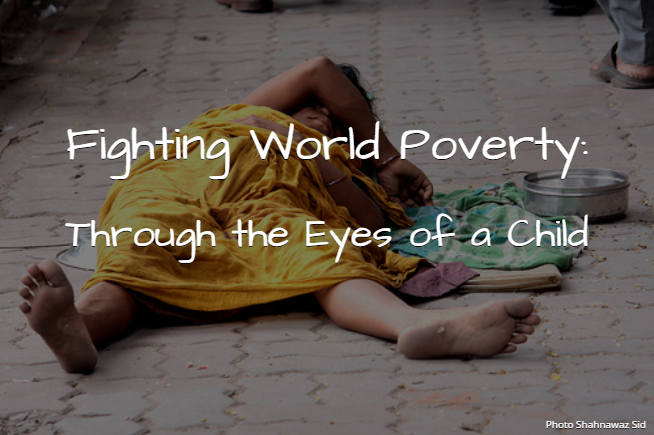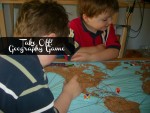 My 1st grader is going through a study on world poverty this year. She came up with some ideas on how to help those who are poor.
My 1st grader is going through a study on world poverty this year. She came up with some ideas on how to help those who are poor.
My 6 year old said:
To help the poor I would like to:
- Go over to their country and build them houses.
- Buy lots of toys and bring them to their country and give them to poor children.
- Buy medicine and send it to the country.
- Give them rice, dried peas, cooking stuff, and animals to take care of.
- Give them different kinds of seeds to grow plants.
- Give them a camera so they can take pictures of things.
- Give them some crayons and markers and paper so they can draw pictures of stuff.
- Dig a well to give them clean water.
- Build a school that doesn’t cost money.
- Help children who need to work by getting them a job at school to help the teachers.
- Give the children bikes so they can get to places faster.
- Give the parents a car so they can get to places faster.
I did a similar study with my boys when they were in 2nd grade and Kindergarten. After my daughter finished her list, I read aloud the lists my boys made 5 years ago.
When my oldest was in second grade he said:
We can buy less stuff, recycle more, build water pumps when there is a drought, provide disaster relief, grow food in poor countries, bring materials to build infrastructure in some countries, and give people an education. We can tell the people who own big companies to pay their workers more, stop making stuff made to break, and stop making us want more and more stuff with advertisements.
My Kindergartner’s list gave us all a laugh when we reread it (because he isn’t someone likely to ever sky dive).
- I would fly an airplane over to a poor place and sky dive with a bag of food and give it to them.
- If there is a flood I would make a big wall so the water couldn’t get through and drown the people.
- If there is a drought I would make a little pipe from the wall and make a lever for them to get the water.
- I would fly an airplane over to a poor place and sky dive and bring parts to build a road, cars, and trucks.
- I would fly an airplane over to a poor place and sky dive and make a school for them to learn and give them money.
- Tell people in stores (corporations) to stop wasting stuff on Earth.
- Earn lots of money and go sky dive and give it to the people who are poor.
After I read everyone’s aloud, I marveled aloud at the three different approaches and how all ideas are needed to tackle a problem like poverty. Working together we can find solutions to help reduce poverty in our world.
I’ve received many comments and questions about the wisdom of doing a world poverty study with children who are younger. This is my second go-around with this study now and it has had a positive influence on all of my kids. Growing up in a materialistic culture has made it a necessary topic. In our culture, kids are bombarded with gotta-have-it and need-more ideas from a very young age. Watching some of the videos in our study have brought my children to tears. Seeing the stark reality has helped motivate my children to action and changed their perspective. They know that they are rich even though they don’t have the money to get what they want. It has been 5 years since I did this study with my 5 and 7 year olds and now this topic is part of a continuing conversation that will likely never cease.







When my eldest was 2 or 3, I’d seen an item on TV about a poor mother who had no money for food, so she made little cookies out of the foul mud by the river, and left them to dry in the sun, so she could give them to her children to have something, anything, to eat. I told my son about it, and his solution was “We could get your purse and my purse and give some money to that mommy, so she could buy some food”. Still makes me tear up, thinking about his simple, direct solution to the problem.
Great! Young children should also be taught (for their own sakes) that most poor work very hard to make their own lives better but whatever they earn has to go to pay for basic living things because we have poor countries have no welfare (i.e. money every week for food). A real way to help is to teach our children that these poor people are very creative and clever, and that if our children’s parents were asked to pay for their education and food, build their own houses or rent or buy, there would be more poor people on our street. Let that be a starting point. Bring the poor to their level to squash any sense of false superiority.
I love this and I adore their answers. What a special project. I would have loved this as a kid. Going to flag this one for my to-do list 🙂 Thanks!